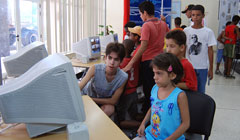The Securities and Exchange Commission Worried about PCs with Celeron Chip in Cuba
- Submitted by: admin
- Computers and Internet
- Science and Technology
- 08 / 07 / 2009

A letter from The Securities and Exchange Commission to Intel is not likely to inspire a future episode of "24."
The June 4, 2009 letter (originally marked "confidential") to Intel from the SEC states: "We are aware of a May 2008 news report that PCs in Cuba contain your Celeron processors. Cuba, Iran, Sudan, and Syria are identified by the State Department as state sponsors of terrorism, and are subject to U.S. economic sanctions and export controls."
The letter continues. "We note that your Form 10-K does not include disclosure regarding contacts with Cuba, Iran, Sudan, and Syria. Please describe to us the nature and extent of any past, current, and anticipated contacts with the referenced countries, whether through distributors, resellers, licensees, or other direct or indirect arrangements."
The letter was cited earlier in The Wall Street Journal.
And what kind of computers are we talking about exactly? (It would strain credulity, I think, to cue in a Jack Bauer narration--"The following takes place between 7:00 a.m. and 8:00 a.m"--here.)
"The Cuban PCs have Intel Celeron processors with 80 gigabytes of memory (sic) and 512 RAM and are equipped with Microsoft's Windows XP operating system. Both could be violations of a U.S. trade embargo, but not something Washington can do anything about in the absence of diplomatic relations with Havana. Clerks said the PCs were assembled by Cuban companies using parts imported from China."
Maybe there's more to this than meets the eye but a lowly Celeron chip (one of Intel's bottom-of-the-performance-barrel processors) is hardly the chip to designate as a threat to national security. In short, data-crunching server farms--assuming they exist--in Cuba are not built with Celeron processors.
For the record, an excerpt from the Intel response is as follows: "Intel has no business contacts with the Subject Countries, either directly or indirectly through tacit agreement with its customers. Intel does not provide products or technology to the Subject Countries...."
A more productive line of inquiry--by another U.S. government agency--might be: Where on the world market might these countries be buying sophisticated multiprocessor computer hardware based on, for instance, the newest high-end Intel Nehalem Core i7 processors?
Now, there's an idea for a future '24' episode.
Source: Cnet
The June 4, 2009 letter (originally marked "confidential") to Intel from the SEC states: "We are aware of a May 2008 news report that PCs in Cuba contain your Celeron processors. Cuba, Iran, Sudan, and Syria are identified by the State Department as state sponsors of terrorism, and are subject to U.S. economic sanctions and export controls."
The letter continues. "We note that your Form 10-K does not include disclosure regarding contacts with Cuba, Iran, Sudan, and Syria. Please describe to us the nature and extent of any past, current, and anticipated contacts with the referenced countries, whether through distributors, resellers, licensees, or other direct or indirect arrangements."
The letter was cited earlier in The Wall Street Journal.
And what kind of computers are we talking about exactly? (It would strain credulity, I think, to cue in a Jack Bauer narration--"The following takes place between 7:00 a.m. and 8:00 a.m"--here.)
"The Cuban PCs have Intel Celeron processors with 80 gigabytes of memory (sic) and 512 RAM and are equipped with Microsoft's Windows XP operating system. Both could be violations of a U.S. trade embargo, but not something Washington can do anything about in the absence of diplomatic relations with Havana. Clerks said the PCs were assembled by Cuban companies using parts imported from China."
Maybe there's more to this than meets the eye but a lowly Celeron chip (one of Intel's bottom-of-the-performance-barrel processors) is hardly the chip to designate as a threat to national security. In short, data-crunching server farms--assuming they exist--in Cuba are not built with Celeron processors.
For the record, an excerpt from the Intel response is as follows: "Intel has no business contacts with the Subject Countries, either directly or indirectly through tacit agreement with its customers. Intel does not provide products or technology to the Subject Countries...."
A more productive line of inquiry--by another U.S. government agency--might be: Where on the world market might these countries be buying sophisticated multiprocessor computer hardware based on, for instance, the newest high-end Intel Nehalem Core i7 processors?
Now, there's an idea for a future '24' episode.
Source: Cnet
Comments